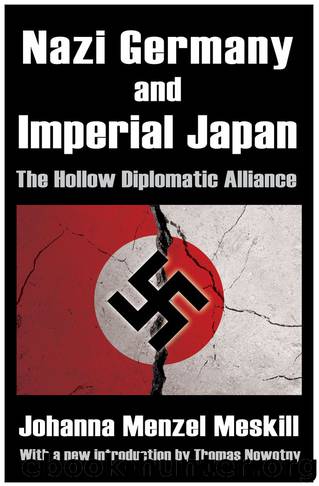Nazi Germany and Imperial Japan: The Hollow Diplomatic Alliance by McLaren Ian A

Author:McLaren, Ian A. [McLaren, Ian A.]
Language: eng
Format: epub
ISBN: 9781412846196
Publisher: Taylor and Francis
Published: 2017-07-27T21:00:00+00:00
The German decision to subordinate her own territorial and economic interests in Asia to the military demands of the moment was undoubtedly wise. Even so, the conflict between her immediate military demands, which required a strong Japanese presence in the western Indian Ocean, and her long-term political interests in that area, which forbade recognizing India as part of the Greater East Asia Sphere, continued to preoccupy the European Axis leaders during the spring of 1942.
Through February and March, as the Japanese approached the Indian border, Germany looked askance at the westward expansion of her ally's claim to rule. Ambassador Ott reported from Tokyo on the "geographically and politically unwarranted interpretation of the Greater East Asia Sphere" by the Japanese press, which, he reported, now annexed India as well as Australia and New Zealand to that sphere; despite Berlin's instructions to proceed with caution, he warned the Japanese that Germany too was interested in Indian affairs.40 Italy viewed the westward extension of Greater East Asia with even greater alarm than did her German ally, either because she considered her own "sphere" in eastern and northeastern Africa endangered by Japanese claims to India, or because, as a European colonial power, she was particularly sensitive to the damage which Japanese claims might inflict upon the notion of Europe's civilizing mission among colonial peoples.
Notwithstanding these signs of alarm in Rome as well as in the German embassy in Tokyo, the German Foreign Ministry adhered to its decision of January not to query the Japanese about the westward extension of their sphere. References to the "yellow peril" were removed from German publications by the censors of the foreign ministry.41 The Japanese must have thought along similar lines, for they too refused to risk a quarrel with their allies over territory which neither of them had as yet conquered. In early April, Tokyo invited Berlin and Rome to cosponsor a declaration of Indian independence, indicating at least implicitly that Japan recognized the rights of Germany and Italy to be heard on Indian affairs.42 Similarly, propaganda, intelligence, and subversive activities against British rule in India were to some extent coordinated by the three powers, often at Japanese initiative.43
As a matter of fact, however, Germany for a time had a somewhat more advantageous position than Japan as sponsor of an Indian-led independence movement, Although Japan had captured in Singapore many Indian soldiers whom she tried to fashion into a Japanese-controlled Indian Liberation Army during the summer of 1942, the Germans down to 1943 held a superior drawing card in the person of Subhas Chandra Bose, easily the most attractive figure among Indian leaders seeking Tripartite support. Bose had come to Berlin, through Afghanistan and the Soviet Union, in early 1941 and had been encouraged to recruit Indian supporters in Europe. He was authorized to set up Indian troop formations in Europe, presumably with the idea of using them in India once Germany had crossed the Caucasus and stood ready to enter India.44
For a time, it looked as if
Download
This site does not store any files on its server. We only index and link to content provided by other sites. Please contact the content providers to delete copyright contents if any and email us, we'll remove relevant links or contents immediately.
The Vikings: Conquering England, France, and Ireland by Wernick Robert(83663)
Ali Pasha, Lion of Ioannina by Eugenia Russell & Eugenia Russell(40245)
The Conquerors (The Winning of America Series Book 3) by Eckert Allan W(37389)
The Vikings: Discoverers of a New World by Wernick Robert(36974)
Cecilia; Or, Memoirs of an Heiress — Volume 1 by Fanny Burney(32548)
Cecilia; Or, Memoirs of an Heiress — Volume 2 by Fanny Burney(31947)
Cecilia; Or, Memoirs of an Heiress — Volume 3 by Fanny Burney(31932)
Empire of the Sikhs by Patwant Singh(23074)
The Secret History by Donna Tartt(19053)
Hans Sturm: A Soldier's Odyssey on the Eastern Front by Gordon Williamson(18575)
Cat's cradle by Kurt Vonnegut(15338)
Pimp by Iceberg Slim(14488)
Sapiens: A Brief History of Humankind by Yuval Noah Harari(14370)
Talking to Strangers by Malcolm Gladwell(13350)
Norse Mythology by Gaiman Neil(13349)
Leonardo da Vinci by Walter Isaacson(13318)
4 3 2 1: A Novel by Paul Auster(12377)
Underground: A Human History of the Worlds Beneath Our Feet by Will Hunt(12090)
The Radium Girls by Kate Moore(12018)
